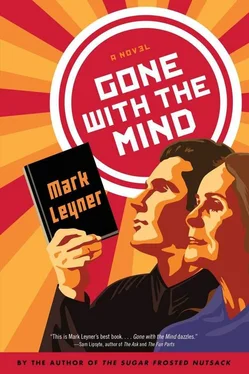When you’re a child, you’re just doing everything intuitively, you’re just using what the Imaginary Intern and I used to call Inuit Intuition (we both loved all things Arctic )…you’re just joyriding with your id at the wheel, thrashing around in a continuous tumult of what South Korean director Kim Jee-woon calls “the good, the bad, and the weird”…which is what life is back then…you’re just acting (I don’t mean in the sense of theater, although that too), you’re just doing things, committing random deeds…And it’s only much later in life that we try to retrospectively map out, to plot all the traumas and the triumphs, the lucky breaks and lost opportunities, all the decisions and their ramifying consequences. And I tend to believe that this inclination to look back on one’s life and superimpose a teleological narrative of cause and effect is probably itself a symptom of incipient dementia, caused by some prion disease or the clumping of beta-amyloid plaques. Certainly as we get older, we begin to compulsively revise, re-edit, and rearrange — like screenwriters thumbtacking index cards to a bulletin board — the same finite repertoire of autobiographical scenes in our memory to see if perhaps the latest rehash might provide any new answers to those fundamental and persistently intractable questions like: How the fuck did this all happen? How the fuck did things ever get to this point? How the fuck did I end up becoming the person I am now? Especially, this…this particularly baroque, grotesque version of the person I am now? To properly answer questions like these would probably require a prolonged period of masochistic self-absorption. But I suppose, in a way, that’s why we’re all here tonight…Am I right, folks? (PANDA EXPRESS WORKER and SBARRO WORKER remain oblivious, one bobbing his head to something he’s listening to on his headphones, the other watching a Snapchat on his cell phone of his girlfriend making fart bubbles in a bathtub.)
Jeffrey Hammerbacher, a professor of genetics and genomic sciences at the Icahn School of Medicine at Mount Sinai, wrote something very interesting when he was seven years old. He wrote, My favorite hobby is doing math while I’m eating. I like doing this because math is my favorite subject and I like to eat.
Well, doing this is my favorite subject, and I like to eat too. So it’s extremely gratifying to be here tonight, reading Gone with the Mind at the food court.
I think I mentioned before that the Imaginary Intern sometimes functioned like a…like a kind of trainer for me. So before we started actually working on the autobiography, for about the first three months, he just had me playing video games and eating cookie dough. And then one night he posted a winky face on my Facebook, and it was like “Game on.” And the first thing we started working on, which was completely out of sequence, was something that happened back in my senior year at Brandeis. My dad had called and told me that Eli — a second cousin of mine, whom I didn’t really know particularly well — was going to…to Tufts, I think it was…starting at Tufts as a freshman…and that it would be nice if I visited him. Eli also wanted to be a writer, according to my dad, and we might have a lot to talk about, and it would just be a nice thing to do. So, I go to visit this guy in his dorm room at Tufts, and we’re drinking some beer and talking about this and that, and at some point he excuses himself to go to the bathroom, and he’s in there for a while, so I’m snooping around his room, checking out his books, rifling through his albums, and I find, on his desk, a draft of a short story he’s working on, this very, very short, Lydia Davis — length story, and I read it, and…obviously I can’t remember the story, this was almost forty years ago…but I distinctly remember its tenor, which I can try to give you at least some flavor of…I mean, I’m just making this up off the top of my head to try to convey the tone…
When the Red Army breached the German front in 1945, Nazi propaganda minister Don Draper would try to lighten the mood in the bunker by fucking a microwaved Bacon Cheddar Hot Pocket. (The PANDA EXPRESS WORKER actually looks up for a moment here.)
Something like that…Anyway, this guy Eli comes back from the bathroom, and he catches me reading it, which he’s perfectly cool with, and he says, “Y’know, that’s just the first draft, would you like to read the second draft?” And I said, “Yes, sure.” And here’s the interesting part of the story — there was a total, bewildering discrepancy between the first draft and the second draft which was this unfailingly decorous, almost Chekhovian twenty-five-page story about an aging spinster who sang Schubert lieder in her attic, a handsome young parson with a humiliating stutter, a pair of Yorkshire terriers, and an heirloom cupboard. So I said to him — and, in retrospect, probably should have just kept my mouth shut — that I preferred the first draft (which I genuinely did; yes, the second draft was very sad in that artisanal way that makes a certain kind of sophisticated reader very happy, and yes, the first draft was a bit adolescent and unrepentantly stupid — sometimes stupidity is the only “way out” for the mind — but it had a certain flip brio to it that I appreciated a lot, and from which I took no small degree of inspiration). And this just really baffled Eli, really perplexed him. And we ended up talking about it for the rest of the night…I think we went out for burgers and shots and beer somewhere in the neighborhood and had this long, very congenial, super-earnest-undergrad kind of debate about the relative merits of draft one and draft two and how they might be analogous to certain sociopolitical currents, etc. And I remember saying…we’d left the bar and were out on the street somewhere…and I was so wasted…I was swaying back and forth…I had to grab onto a…a…telephone pole to stay upright…and I remember saying: “If we’ve learned anything from Lévi-Strauss, it’s that individual motifs mean nothing in any abstract sense until they are placed in a structural relationship with other motifs.” And then I passed out. And I don’t remember anything else from that night…Actually the whole rest of that senior year is a kind of blur after that. And then years later, my dad calls me one night and he says, “Do you remember your cousin Eli?” And I go, “Yeah…” And he says, “Well, you did him a big favor by insulting him about his writing.” And I say, “Dad, I never insulted him about his writing, I just told him I preferred one draft of a story to another.” And my father says, “Well, whatever you said to him, you did him the biggest favor in the world, because after that he gave up wanting to be a writer, and he went to medical school, and he became some kind of research scientist for a series of very prestigious institutions and big biotech companies, and I just learned from his mother that he exercised his stock options and that he’s retired, and that he and his wife bought a penthouse at 15 Central Park West and a huge, gorgeous estate in a gated community out in Calabasas, and that they’re traveling and skiing and scuba diving and spelunking all over the world.” And he says, “I’m really surprised he hasn’t called you in all these years and thanked you for insulting his story.” And I say, “Well, he’s probably too busy spelunking to call, and anyway the cell-phone coverage in caves is pretty shitty.” And my dad says, “You’re probably right.”
And when the Imaginary Intern and I were working on this (and actually we eventually decided not to use it at all because we were becoming increasingly militant about not including any extended anecdotes or vignettes that had any “form”—we were always complaining about the “inanity of form” because, to us, that smacked of “literature” and of “novels,” which we were both dead set against, I guess because of the unspeakable things that had happened to us in our lives)…the Imaginary Intern said, “You know what my favorite part of that story is? When you say to your father, ‘The cell-phone coverage in caves is pretty shitty,’ and he says, ‘You’re probably right.’ I don’t know why, or even if this is what you intended, but I thought that was really quite poignant…almost in an artisanal way.” And I quoted from Mao’s Talks at the Yan’an Forum on Literature and Art: “Discard what is backward and develop what is revolutionary,” and so that’s just what we did, we discarded the whole story. And that’s why it’s not in the book and that’s why you won’t be hearing it later tonight.
Читать дальше












